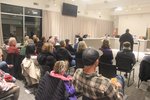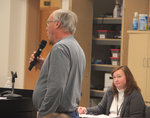


About 30 people packed Blaine’s planning commission public hearing December 8 on a proposed zoning text amendment that would allow large manufactured home parks in east Blaine. After two hours of discussion and debate, the commission tabled the vote for a future meeting.
City zoning code inconsistencies currently don’t allow manufactured homes in residential planned unit developments (PUDs) within the city’s planned residential zone, which runs east of 15th Street to city limits and from the U.S./Canada border to H Street Road. However, manufactured home parks less than five acres, meaning they are not part of a PUD, are allowed in east Blaine.
Background
While the public hearing was on changing the zoning code inconsistencies, most of the public’s concerns surrounded potential manufactured home development in East Harbor Hills. Developers Skip and Katie Jansen, of JIJ Corporation, asked the city to address the zoning code inconsistencies at the beginning of the year. If the code is changed, the city would still need to consider approval for manufactured homes in East Harbor Hills or any other residential PUD, Stacie Pratschner, the city’s community development services (CDS) director, previously told The Northern Light.
“Really what’s at issue here is a discrepancy in the code,” said Craig Parkinson, principal engineer of Cascade Engineering Group, who is the developers’ client and also working on other Blaine projects such as Semiahmoo Highlands. “The [planned residential] zoning has a requirement in it that states projects over five acres must do a PUD. So if you have a site that’s less than five acres, you may do a manufactured home park on it today.”
The inconsistencies were made inadvertently through various code changes and adoptions since a 2001 ordinance on manufactured homes, Parkinson said. In 2001, city council adopted an ordinance to allow manufactured homes, parks and subdivisions in east Blaine. Manufactured home standards were changed in 2005 to adhere to state law. In 2009, city council revised the code for PUDs to exclude manufactured homes, and staff was unable to determine why that change was made, according to the staff report for the December 8 hearing.
Parkinson said the developers would like to create single-family, multi-family and manufactured homes within the development because those will generate more income in the current housing market. City code doesn’t allow single-wide or park-model homes in a manufactured home park. The park must have at least 20 feet of a vegetation buffer and a city-approved landscaping plan, among other requirements, Parkinson said.
“They look almost indistinguishable from stick-built homes,” Parkinson said. “They’ve got landscaping. They’ve got streets that meet requirement standards. They have open space amenities.”
Public hearing
East Blaine resident Shanna Leeland expressed concern about the developers’ notion that manufactured homes would be affordable. She argued families wouldn’t build equity because manufactured homes depreciate and seniors living on a fixed income would be at risk of being priced out if their monthly rent increased, a trend Leeland was seeing across the U.S.
Of about a dozen people who spoke during the hearing, two supported the mobile home park: Paul Schissler, an affordable housing advocate from Bellingham, and Grandis Pond developer Ken Hertz, of Bellingham.
Schissler, a community development planner, has been advocating for affordable housing in Blaine over the past year on behalf of several organizations including Kulshan Community Land Trust, the Whatcom County Executive’s Office and Opportunity Council. Schissler suggested during the hearing that manufactured home parks could operate as co-op housing where all of the owners held a share of the park, opposed to an investment company potentially purchasing the park.
“Manufactured housing parks can be owned by the homeowners,” he said. “A homeowner association can own the land and lease the homes to themselves so it takes the profitability completely out of the picture and takes the idea that it’s a capital gain someday to be sold.”
After the meeting, Schissler pointed to Resident Owned Communities Northwest as an example of co-op manufactured home parks in Washington and Idaho.
Semiahmoo resident April Hashimoto said east Blaine faces the same concerns that Semiahmoo residents brought to the city’s attention in the spring about the city not being prepared for large-scale development.
“This text amendment that is the subject of tonight’s meeting should not be reviewed in isolation as one discrete approval,” Hashimoto said. “It should be evaluated within a planning context considering all of the consequences that should be triggered by its approval.”
Hashimoto collected 455 signatures on a petition for the city and Whatcom County governments against unmanaged development of the nearly 500-unit Semiahmoo Highlands. The petitioners made it clear they were not against development; they just asked no approvals be made until the completion of a storm water plan, comprehensive wastewater strategy, traffic study and environmental impact study more rigorous than the already required State Environmental Policy Act checklist.
Hashimoto said in an email to The Northern Light that she never received a response from either the city or county, except for one acknowledgement that the city had received the petition.
Several residents voiced frustration, saying they believed they had done more research than the city. Community members asked for issues on water quality and supply, schools, taxes and wetlands to be addressed.
The Jansens sat alongside their son Anthony, a project manager at Henbart LLC in Seattle, during the meeting. Henbart develops, owns and manages real estate investments across the Pacific Northwest.
“It’s just a misunderstanding of what we’re trying to do,” Skip Jansen said after the hearing. “What we’re trying to do is correct an error in the code. The way they’re trying to make it look is that we’re trying to change the zoning and we’re absolutely not trying to change the underlying zoning. The underlying zoning allows exactly what we’re doing.”
Skip Jansen said manufactured homes aren’t for everyone, but are an option for others.
“It works for a certain number of people and it’s definitely more affordable than stick-built homes,” he said.
Commission deliberation
After the public hearing, commissioner Calvin Armerding asked staff if the city could restrict mobile home parks to only be operated as co-ops, opposed to corporate or developer-owned land.
“The sticking point of this whole process boils back to who owns the land,” Armerding said. “It concerns me that there are corporations devoted to collecting these kinds of things but I do like the idea of a co-op.”
CDS community planner Stacy Clauson said staff would need to seek legal assistance because the city typically doesn’t regulate a project’s ownership model.
Commissioner Kevin Owens said he wanted more time to research because he had more questions than when the meeting started.
“If we were talking about a project that was 4.99 acres, we actually wouldn’t be having the conversation,” Owens said. “All of the same issues would exist. All of the same negatives and all of the same potential positives, if there are any. That’s what I’m struggling with. Is the scale the fact that is affecting our determination whether to amend the law or to not to?”
Commissioner James Bring said he was concerned about future development’s impact on water quality, which Armerding said was a much broader development issue and sizable east Blaine neighborhoods had already been approved.
Commissioner Jerry Marczynski said he’d like to find solutions to some of the questions raised before making a decision. He said he wanted to know if the planning commission could eliminate all future manufactured home parks within city limits.
“This is a broader conversation because, from what I’ve heard from the community, this is about land ownership,” Marczynski said. “Us saying ‘no’ to this project doesn’t stop the problem. It still sits there in a different regulation.”
Commissioner Jessica Stone agreed that the planning commission needed to go beyond the zoning text amendment in front of them, but said they needed to make an immediate decision.
Stone made a motion to deny the zoning text amendment, seconded by commissioner Jennifer Plombon, but the motion failed due to a lack of majority (there are only six members on commission as one seat is vacant). Commissioners unanimously approved tabling the vote for a future meeting so more research could be done. The commissioners are expected to deliberate on the zoning text amendment during their January 12, 2023 meeting, which isn’t slated to have another public hearing.
“This is really exciting for us,” Armerding said. “I don’t think we’ve had more than six people [attend a meeting].”
This article has been updated to correct a misquoted word. We regret the error.
2 comments on this item Please log in to comment by clicking here
Paul_Schissler
Good summary of the Planning Commission meeting. Thank you. The conflicting information is being considered by the PC, and many questions were not answered yet. One important point: all new MH can be high-quality, all electric, energy efficient, and a decent investment. It was great to hear that co-op ideas are considered a remedy to the legitimate concern about homeowners being at the mercy of someone allowed to overcharge for land rents. Over 100 years ago in the US, we saw the co-op ideas catch on, in the form of shared-equity co-ops as the co-ownership of homes, apartment buildings, and neighborhood shops. In today's example, the land of a MH community can be owned by a local co-op corporation, and each homeowner owns a share. The co-op will lease the land to MH shareholders, and the co-op will use predictable expenses to set the annual land rents. The goal is to break even; profitability is not the motivation. As another way to help finance new co-ops, we have possibility the co-op landowner gives up the speculative windfall of future land prices, and in return, converts that into an immediate investment. The net present value of that future capital gain could be worth a lot of money, based on recent trends in land prices. The catch is the homes in the capital project must aim to be permanently affordable. Affordability is a complicated business. I appreciate being able to comment here. P
Thursday, December 15, 2022 Report this
LisaCosky
Because there was no final decision at the end of the Planning Commission’s meeting on December 8th, they will be a voting at an upcoming meeting to decide whether or not to change verbiage in a zoning code that would allow for “high density” mobile/manufactured home park(s) to be established on the north side of H Street from Harvey Rd to Valley View Rd.
I’d like to voice my opposition to any change in zoning that would allow these “high density” parks to take place. My concern and opposition lie with the devastating effects these “high density” parks will have on our environment.
As mentioned in the letter to the Editor dated January 4th in the Northern Light by Don Kruse, the proposed park(s) are planned to sit atop of the recharge area for the aquifer for all of Blaine, Birch Bay and much of the surrounding area.
As we all know, water is one of most essential components to life. Currently, we have a clean water source that we all enjoy. By putting “high density” housing atop of our natural recharge and filtering source, we don’t just risk contaminating the aquifer that we all depend on, we guarantee its contamination.
My question to the Planning Commission is what happens then?
Do those of us who live in Blaine, Birch Bay, and surrounding areas that depend on clean water, which we currently have, need to help pay for the building of a water treatment plant?
Will those of us who live and depend on clean wells, be now required to “hook” into the city’s water system when our wells become fouled from contaminates due to “high density” housing developments?
At whose expense?
Not only does drinking water become a concern but flooding also becomes an issue. Even now, with much of the land undeveloped, there is flooding that occurs during the fall, winter and spring months. How much more flooding can we expect when acres of land that were once able to help absorb rainwater, and filter our drinking water, are covered with mass amounts of concrete and asphalt?
One of the arguments used by the developers to offset the environmental abuse and destruction a “high density” mobile/manufactured home park will have been that they are bringing “affordable” housing to the community. But are they? Bank loans on manufactured homes have as much as a 3-4% higher interest rate than that of a stick-built home. That is if one can find a bank to offer a loan, as banks are now hesitant to approve loans on mobile/manufactured homes because of the lack of equity when one does not own the property the home will be placed on.
Once a mobile or manufactured home is set, it usually is never moved. Insurance only allows for one or two moves due to structural damage that they don’t wish to cover. This can mean that a person who has their mobile or manufactured home on land that they do not own is held hostage to rent increases. A person could find themselves not being able to pay the rent for their site but then neither can they move it or get out from under rent and loan payments by selling their mobile or manufactured home because of the depreciation that goes hand in hand with a mobile or manufactured home on a rental site.
I agree that there is a need for affordable housing. However, a “high density” mobile/manufactured home park is NOT affordable housing. I would refer you to a letter submitted to the Planning Committee dated May 13, 2022, by Shanna Leeland outlining arguments why mobile/manufactured home parks are not affordable, which also lists all research resources. And do we really want to allow any “high density” population to be constructed on top of our drinking water?
I would encourage everyone in the community that is opposed to changing the zoning code and allowing “high density” mobile/manufactured home parks to be established between Harvey Rd. and Valley View Rd. to write to our Planning Commission and/or come to the next meeting regarding this matter.
Lisa Cosky
Sunday, January 15, 2023 Report this